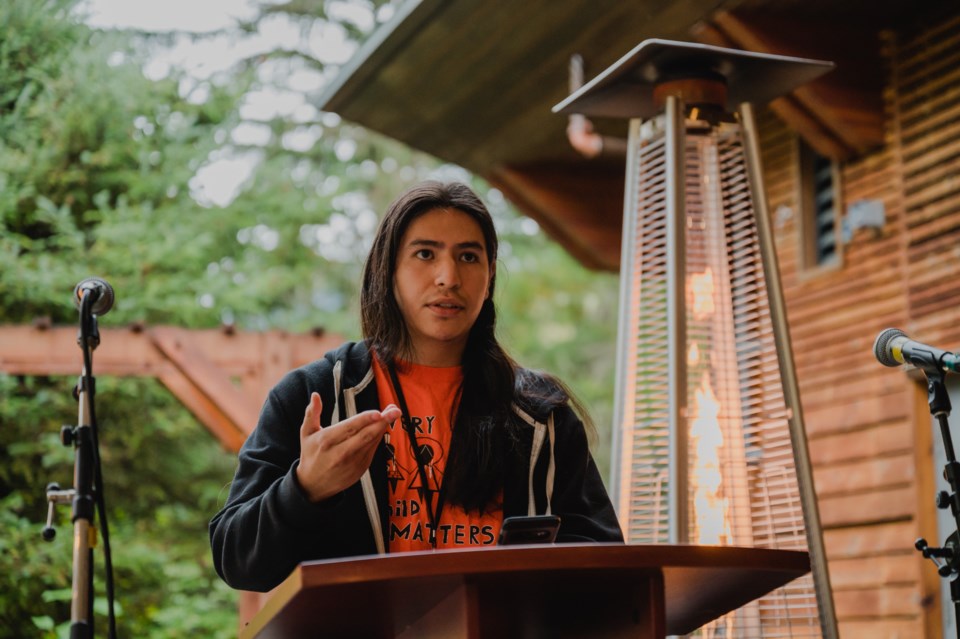It being the resort’s largest social- service provider, it’s clear to see how the Whistler Community Services Society (WCSS) helps facilitate Whistler’s well-being.
But Whistler’s Indigenous museum, the 麻豆社国产Lil’wat Cultural Centre (SLCC), has also played a vital role in caring for the community as it undergoes the challenging work of Truth and Reconciliation.
“[This program] talks about what the SLCC is and how we serve the community, how we really were an essential service in this community in the past towards reconciliation, and a resource,” said Heather Paul, executive director of the SLCC.
The program Paul is referring to is a partnership between the cultural centre and WCSS to deliver free and accessible , led by elders and ambassadors from the 麻豆社国产and Lil’wat Nations themselves.
“The goal was to really trigger and level up a journey towards reconciliation for Whistler,” Paul said. “It’s really to have you, when you leave that room, witness into yourself and into the world around you how colonization has really given [non-Indigenous Canadians] privilege and an advantage, and where it’s built everywhere into the systems around you. It’s not meant to hurt you or shock you; it’s meant to refocus your vision a little bit. A change of perspective.”
The first six-hour session was held Oct. 6 at the SLCC, and they will continue each month, through February 2023. They include traditional local Indigenous foods for lunch, tours of the museum’s exhibits, and learning seminars that are divided into different topics, such as reconciliation and Indigenous governance, led by SLCC ambassadors, cultural educator Tanina Williams from the Lil’wat Nation, and decolonial consultant from the 麻豆社国产Nation, Ta7tali虂ya Michelle Nahanee, founder of Nahanee Creative Inc.
Part of the goal of the workshops is to create a safe space for non-Indigenous participants to learn and engage in difficult conversations, no matter where they are in their personal reconciliation journey.
“Maybe they’ve just arrived, maybe they’ve lived here for a really long time and there isn’t that real cultural awareness, so the goal is to provide that to people at no cost: an opportunity to come into the space, learn from elders within the community, give them lunch, space, and time,” said Jackie Dickinson, executive director of the WCSS. “That’s the beginning. It’s not the end.”
The sessions also help to define what the SLCC does and the role it plays in the community, both for non-Indigenous and the local First Nations members who have commonly struggled in the past to feel welcome in Whistler.
“It’s really for the community to understand what we do and the people in the building,” Paul said. “I really want them to know their names. One thing Georgina [Dan, SLCC cultural administration coordinator and co-facilitator of its Indigenous Youth Ambassador program] was saying is, ‘Know my name. Just know my name.’”
The partnership between both organizations is significant as well, particularly given the harms and stigmas the local Indigenous community has historically faced when entering the health- care and social-service spheres.
“I think the puzzle pieces fit together very well,” Paul said. “We want to make a progressive, positive relationship moving forward in wellness, and we also want the ambassadors and the families of the ambassadors who work here to ultimately see WCSS as a resource as well. We look to WCSS on how to provide that kind of support and how we best serve, and we want to be able to help WCSS access culturally aware resources for the community.”
The program was funded in part by a Heritage BC 150 Time Immemorial grant that WCSS applied for, as well as additional support from the Fairmont Chateau Whistler and the Whistler Blackcomb Foundation, the latter stepping in at the 11th hour to ensure all six workshops were free to the community.
The next session is Nov. 3, from 8:45 a.m. to 2 p.m., at the SLCC. Attendance is free, but , and limited.


